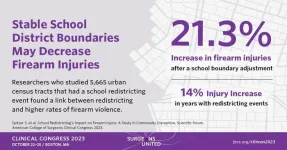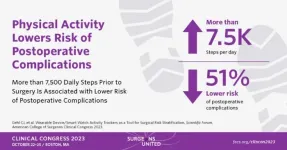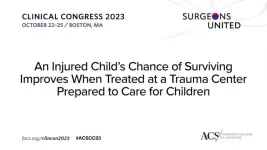(Press-News.org) LA JOLLA, CA—Scientists from La Jolla Institute for Immunology (LJI) and The University of Southampton, UK, have uncovered a group of immune cells that may drive severe asthma. These cells, called cytotoxic CD4+ tissue-resident memory T cells, gather in the lungs and appear to possess the molecular weaponry to cause the most harm in men who developed asthma later in life.
"If you are male and you develop asthma after age 40, there's a high chance this T cell population is in your lungs," says LJI Research Assistant Professor Gregory Seumois, Ph.D., who co-led the study with LJI Professor Pandurangan Vijayanand, M.D., Ph.D.
The scientists uncovered these pathogenic T cells thanks to volunteers enrolled in the NHS-clinic based WATCH study, which follows hundreds of asthma patients of different ages, sexes, and disease severities. By following patients over many years, and analyzing their immune cell populations, researchers are making new connections between asthma symptoms and immune cell activity.
"Once you understand the role of cells like these T cells better, you can start to develop treatments that target those cells," says WATCH study director Ramesh Kurukulaaratchy, BM, DM, FRCP, Associate Professor at the University of Southampton and researcher at the NIHR Southampton Biomedical Research Centre.
The scientists now hope to learn more about these cells—and their role in asthma development—as they work to bring personalized therapies to asthma patients.
How harmful T cells drive asthma
So how might these harmful, or "cytotoxic," CD4+ tissue-resident memory T cells trigger asthma in older men? The problem may come down to a combination of immune cell "memory" and an absence of helpful cells in the lungs.
These T cells are called "memory" cells because they react to molecules that the body has previously fought off. This kind of immune cell memory helps protect the body from viruses and bacteria. Unfortunately, the same T cell memory is a big problem for asthma patients. Their misguided T cells see harmless molecules, such as pollen, and mount a dangerous inflammatory response.
The new research suggests asthma patients with these T cells in their lungs may be primed for hard-to-treat, and potentially fatal, asthma attacks.
The scientists aren't sure why these T cells tend to cause problems for older men. Seumois is interested in solving this mystery through LJI's Center for Sex-Based Differences in the Immune System. "We know that females have a different immune landscape," says Seumois. "So we're interested in investigating this question further."
LJI graduate student Sara Herrera de la Mata used a technique called single-cell RNA sequencing to learn more about immune cells in these patients. She found that certain anti-inflammatory T cells that should counteract severe asthma symptoms were scarce in airway fluid samples (BAL samples) from this patient group.
Instead, men who developed asthma later in life had an overwhelming number of potentially harmful T cells. Their lungs should have been home to a diverse bunch of CD4+ T cell types, and yet for this group, more than 65 percent of their cells were cytotoxic CD4+ tissue-resident memory T cells.
"Normally, a doctor would give a severe asthma patient a steroid or biologics therapy to dampen their immune response, and that should be it," says Herrera de la Mata, who served as co-first author of the study. "But these cells may not respond to these treatments."
Spotting this immune cell imbalance was an important clue that this patient group represented a new asthma subtype.
Discovery could lead to personalized asthma treatments
The sequencing work at LJI gives scientists a "biomarker" to help them detect cytotoxic CD4+ tissue-resident memory T cells in more patients going forward.
In fact, finding this biomarker represents a "paradigm shift" in asthma research, says Kurukulaaratchy. Before now, scientists and clinicians separated asthma patients into just two groups: "T2 high" and "T2 low." This dogma isn't helpful for patients or clinicians, says Kurukulaaratchy. As a clinician, he knows that the T2 high group actually includes a huge range of patient demographics and symptoms.
"We've studied a subgroup of male patients who developed asthma later in life—and they do badly. They need a lot of treatments, such as high doses of toxic steroid treatments," says Kurukulaaratchy.
In a study published earlier this year, the research team showed the importance of "drilling down" to identify many more asthma patient subgroups. Their analysis reveals that 93 percent of WATCH subjects with severe asthma were in the T2 high category. Clearly, T2 high is a broad category.
"T2 high" is too broad, in fact, to really help doctors narrow down treatment strategies for individual patients, explains study co-author S. Hasan Arshad, MBBS, DM, FRCP, Chair in Allergy and Clinical Immunology at the University of Southampton, researcher at the NIHR Southampton Biomedical Research Centre, and Director of The David Hide Asthma and Allergy Research Centre, Isle of Wight.
"We have to think of severe asthma as having different subtypes, and the treatment has to be tailored according to these subtypes—because one size does not fit all," says Arshad.
The researchers' mission now is to use sequencing tools and other techniques to discover additional biomarkers and asthma patient subtypes. Seumois says he is looking forward to continuing his collaboration with Southampton scientists and the WATCH cohort. He's also making plans to examine immune cells in more patient groups, including a cohort that includes African American and Hispanic patients, two understudied demographic groups known to be at a higher risk for developing severe asthma.
"By looking at clinical features of asthma and biometrics, we're finding things that have never been shown before," says Seumois.
Additional authors of the study, "Cytotoxic CD4+ tissue-resident memory T cells are associated with asthma severity" include co-first authors Ciro Ramírez-Suástegui and Heena Mistry, as well as Francisco Emmanuel Castañeda-Castro, Mohammad A. Kyyaly, Hayley Simon, Shu Liang, Laurie Lau, Clair Barber, Monalisa Mondal, and Hongmei Zhang.
This study was supported by the National Institutes of Health (grants R01HL114093, U19-AI070535, S10RR027366, and S10OD025052), the William K. Bowes Jr. Foundation; and BioLegend. The WATCH study is supported by the Southampton NIHR Biomedical Research Centre and the Southampton NIHR Clinical Research Facility, which are funded by the NIHR and are a partnership between the University of Southampton and University Hospital Southampton NHS Foundation.
DOI: 10.1016/j.medj.2023.09.003
About La Jolla Institute
The La Jolla Institute for Immunology is dedicated to understanding the intricacies and power of the immune system so that we may apply that knowledge to promote human health and prevent a wide range of diseases. Since its founding in 1988 as an independent, nonprofit research organization, the Institute has made numerous advances leading toward its goal: life without disease. Visit lji.org for more information.
END
Army of specialized T cells may trigger asthma attacks in older men
International team zeros in on immune cells responsible for some hard-to-treat asthma cases
2023-10-20
ELSE PRESS RELEASES FROM THIS DATE:
A cancer survival calculator is being developed using artificial intelligence
2023-10-20
Key Takeaways
A cancer survival calculator prototype developed with machine learning showed that for each of three cancer types tested, more factors than cancer stage significantly influenced patients’ survival.
Preliminary research on the calculator found high accuracy of this individualized survival estimator.
BOSTON (October 20, 2023): Researchers have developed an artificial intelligence (AI)–based tool for estimating a newly diagnosed cancer patient’s chances for surviving long term, according ...
Study links school redistricting to higher rates of firearm violence in urban communities
2023-10-20
Key takeaways
This is the first study to examine the impact of school redistricting on firearm violence in urban communities, examining data from 63,000 urban census tracts.
Any school redistricting event was associated with a 10.6% higher firearm incidence rate compared with communities that had no redistricting, and school boundary adjustments were associated with a 21.3% increase.
In areas that had a school redistricting event, firearm violence increased 14% in the year the redistricting occurred over the previous year.
BOSTON (October 20, ...
East Los Angeles program to remove tattoos may help reduce traumatic injuries
2023-10-20
Key Takeaways
Tattoos, especially those related to gangs and sex work, can make individuals targets for violence.
Tattoos may also make it more difficult for individuals to make changes in their lives, including finding a job or joining the military.
Nearly nine out of 10 of the program’s clients (88%) desired tattoo removal to transition to a healthier life, and more than eight of 10 clients (81%) reported success in achieving their goals after tattoo removal.
BOSTON (October 20, 2023): Tattoo removal may help to reduce violence and trauma in East Los Angeles, according to study results being presented at the American ...
More than 7,500 daily steps prior to surgery is associated with lower risk of postoperative complications
2023-10-20
Key takeaways
Using Fitbit activity tracking data, researchers identified patients who might be at higher risk of postoperative complications. Fewer daily steps were associated with a higher rate of complications postoperatively.
The odds of complications within 90 days after hospital discharge were reduced by half if a patient took more than 7,500 steps a day before the operation, after adjusting for the complexity of the procedure, comorbidities, and other factors.
CHICAGO (October 20, 2023): Patients who recorded more ...
Pediatric trauma more common during COVID-19 pandemic, especially for children in disadvantaged neighborhoods
2023-10-20
Key Takeaways
Childhood trauma rates increased during the COVID-19 pandemic and were disproportionately higher for children in socioeconomically deprived areas.
In this vulnerable population, injuries were most often due to motor vehicle crashes, firearms, and non-accidental trauma.
The study adds to growing evidence of pandemic-related effects on health and reinforces the need for efforts to prevent pediatric trauma.
BOSTON (October 20, 2023): Injuries from gunshots and motor vehicle ...
An injured child’s chance of surviving improves when treated at a trauma center prepared to care for children
2023-10-20
Key Takeaways
Trauma centers with the highest pediatric readiness scores (93 or greater) on a national assessment have much lower death rates than centers scoring lower.
All trauma centers should address gaps in pediatric emergency care — most importantly, the lack of having a pediatric-specific quality improvement plan.
BOSTON (October 20, 2023): Children initially treated at trauma centers with the highest level of preparedness to care for children, called pediatric readiness, are significantly less likely to die than those initially treated at trauma facilities with lower pediatric readiness levels, new research shows. The findings are being presented ...
Reliable patient education materials on breast cancer are difficult to access
2023-10-20
Key Takeaways
Women with breast cancer, who are making complex decisions about treatment options during an already stressful time, may turn to the wide variety of materials available online, which are not always from data-driven sources.
Researchers found that educational materials often vary in quality, can have a negative tone, and are written above the sixth-grade reading level recommended by the National Institutes of Health.
BOSTON (October 20, 2023): Women with breast cancer must often make complex decisions about surgery and treatment options ...
Team looking at gene therapy for children paralyzed by rare mutations
2023-10-20
SAN ANTONIO, Texas, USA (Oct. 20, 2023) — The 50 families stretch from the Netherlands and the United Kingdom to the United States and China. Each family has a child who is paralyzed from a mutation in a single gene named Contactin-Associated Protein 1 (Cntnap1).
The children are locked inside their bodies, unable to move. The families feed them and change them, and someone monitors them 24/7.
Thousands of miles away in South Texas, Manzoor Bhat, MS, PhD, and his team at The University of Texas Health Science Center at San Antonio are making ...
UCLA Health part of new study digging into the unknowns of bipolar disorder
2023-10-20
A new study is gathering extensive data about people with bipolar disorder to improve diagnosis and treatment of this mental health condition that affects 40 million people worldwide, according to the World Health Organization.
UCLA Health is among six inaugural sites of the BD2 Integrated Network, which aims to enroll 4,000 participants for the study. Researchers intend to collect health metrics, brain scans, self-reported symptoms and data on movement and sleep from wearable trackers, over time, in what’s known as a longitudinal cohort study.
The BD2 Integrated Network also forms a learning collective among the ...
Insilico Medicine presents at Future Investment Initiative Conference in Riyadh
2023-10-20
Executives from clinical stage artificial intelligence (AI)-driven drug discovery company Insilico Medicine will present on the impact of AI on biotechnology at the Future Investment Initiative (FII) Conference in Riyadh, Saudi Arabia.
Alex Zhavoronkov, PhD, founder and CEO of Insilico Medicine and Petrina Kamya, PhD, Head of AI Platforms and President of Insilico Medicine Canada will present on the topic “Will AI Rebuild Biotech?” on Oct. 26, 11:45am Arabic Standard Time. The event is available to be livestreamed.
The FII Conference brings together the world’s foremost CEOs, policymakers, ...
LAST 30 PRESS RELEASES:
Children with poor oral health more often develop cardiovascular disease as adults
GLP-1 drugs associated with reduced need for emergency care for migraine
New knowledge on heritability paves the way for better treatment of people with chronic inflammatory bowel disease
Under the Lens: Microbiologists Nicola Holden and Gil Domingue weigh in on the raw milk debate
Science reveals why you can’t resist a snack – even when you’re full
Kidney cancer study finds belzutifan plus pembrolizumab post-surgery helps patients at high risk for relapse stay cancer-free longer
Alkali cation effects in electrochemical carbon dioxide reduction
Test platforms for charging wireless cars now fit on a bench
$3 million NIH grant funds national study of Medicare Advantage’s benefit expansion into social supports
Amplified Sciences achieves CAP accreditation for cutting-edge diagnostic lab
Fred Hutch announces 12 recipients of the annual Harold M. Weintraub Graduate Student Award
Native forest litter helps rebuild soil life in post-mining landscapes
Mountain soils in arid regions may emit more greenhouse gas as climate shifts, new study finds
Pairing biochar with other soil amendments could unlock stronger gains in soil health
Why do we get a skip in our step when we’re happy? Thank dopamine
UC Irvine scientists uncover cellular mechanism behind muscle repair
Platform to map living brain noninvasively takes next big step
Stress-testing the Cascadia Subduction Zone reveals variability that could impact how earthquakes spread
We may be underestimating the true carbon cost of northern wildfires
Blood test predicts which bladder cancer patients may safely skip surgery
Kennesaw State's Vijay Anand honored as National Academy of Inventors Senior Member
Recovery from whaling reveals the role of age in Humpback reproduction
Can the canny tick help prevent disease like MS and cancer?
Newcomer children show lower rates of emergency department use for non‑urgent conditions, study finds
Cognitive and neuropsychiatric function in former American football players
From trash to climate tech: rubber gloves find new life as carbon capturers materials
A step towards needed treatments for hantaviruses in new molecular map
Boys are more motivated, while girls are more compassionate?
Study identifies opposing roles for IL6 and IL6R in long-term mortality
AI accurately spots medical disorder from privacy-conscious hand images
[Press-News.org] Army of specialized T cells may trigger asthma attacks in older menInternational team zeros in on immune cells responsible for some hard-to-treat asthma cases








